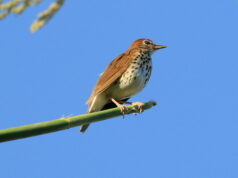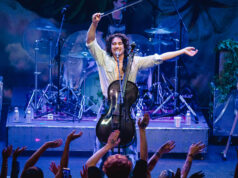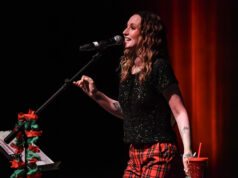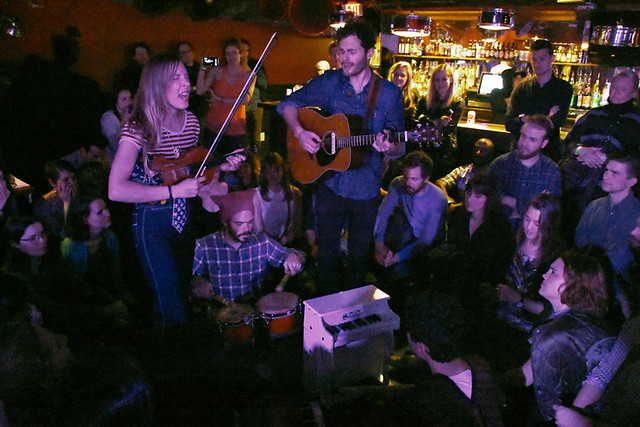
River Whyless perform at DC9 in 2017. (Photo by Mark Caicedo)
Required Reading is Parklife DC’s essay series on music appreciation.
“Just as we talked about the community, I think it’s one thing to see an artist or a song in a one dimensional way, but what’s really inspiring is when you see an actual human being onstage with an instrument made of wood and wires, and one microphone, do something so moving that it conjures emotion and you fall into like a romantic state of loving life because people do great things.” — Dave Grohl, Alternative Nation, October 2019
I fear for our community — our community of musicians, artists, fans, and all the independent venues that support them. During this pandemic we are all afraid: for our health, our loved ones, our friends. I’ve spent the last few years rediscovering live music through photography and documenting how live performance brings together people from diverse backgrounds, age groups and walks of life. But the coronavirus pandemic has changed all that and now our community faces a future that seems more uncertain with each passing day.
There is a faint glimmer of hope on the horizon. The recent formation of the National Independent Venue Association or NIVA marshals the strength of independent venues, their employees, artists, fans, and their communities to seek federal support to ensure the survival of small and mid-sized venues across the country. To date, NIVA’s membership exceeds 1,300 venues in all 50 states, with many in the DC Metro area, including the 9:30 Club and Pearl Street Warehouse in DC, Jammin’ Java and the Birchmere in Virginia, and Ottobar and Metro Gallery in Maryland.
To rally support for music venues, NIVA has rolled out the social media hashtag #SaveOurStages.
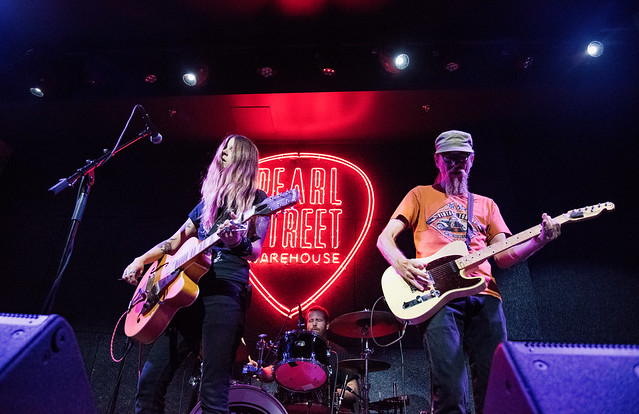 Sarah Shook and the Disarmers perform in 2018 at Pearl Street Warehouse
Sarah Shook and the Disarmers perform in 2018 at Pearl Street Warehouse
According to a 2016 IBISWorld study, the live music industry produced $23.5 billion in annual revenue. The economic damage independent venues face is staggering; for every dollar spent on a ticket an estimated $12 in economic activity is generated in the surrounding communities on restaurants, hotels, taxis, and retail establishments. The complete and sudden pandemic shutdown and the resulting loss of this revenue stream has been a devastating blow.
NIVA President Dayna Frank, owner of Minneapolis’ First Avenue (the 50-year-old venue made famous by Prince, the Replacements, and Hüsker Dü) says, “Music venues were the first to close and will be the last to open. It’s just brutal right now, and the future is predictable to no one. We can’t envision a world without these music venues, so we’ve created NIVA to fight for their ability to survive this shutdown, which we hear could go into 2021. Our first order of business is to push to secure federal funding to preserve the ecosystem of live music venues and touring artists.”
Small, local venues have a hard enough time as it is staying afloat. Between small margins and ever-present economic uncertainty, these venues can’t rely on a constant cash flow like larger, corporate owned venues. In the DC area, two beloved venues, Rock and Roll Hotel and Gypsy Sally’s, closed in the last year. Under normal circumstances, music venues come and go due to the standard, and sometimes unforgiving, rules of the marketplace, but the pandemic closures are an existential threat for the DC Metro area’s (and nation’s) independent venues.

Rob Williams performs in 2018 at Gypsy Sally’s Vinyl Lounge
Chief among the many indispensable roles played by local music venues is that of a proving ground, or perhaps more accurately, an incubator. For every stadium filling Boss or Gaga, there are thousands of musicians playing local bars, coffeehouses, or restaurants building a following one fan at a time. These rooms offer open-mic nights, opening slots with more established bands and most importantly, the experience of performing before a live audience. The opportunity to gain invaluable experience, honing their craft, and mingling with other musicians cannot be overstated.
Just ask up and coming local D.C. singer-songwriter Gabrielle Zwi, who says, “I started my involvement in the DC music scene playing open-mics which was a wonderful way to connect and collaborate with people. Independent venues have been absolutely vital in my growth and in my ability to connect with local artists and potential.”
 Gabrielle Zwi performs in 2019 at the 9:30 Club.
Gabrielle Zwi performs in 2019 at the 9:30 Club.
The forced shutdown also threatens the survival of the ecosystem that connects independent venues, musicians, and fans. Another homegrown DC musician, Jonny Grave, told Parklife DC last year, “Recently at DC9 I saw FINK, one of my favorite songwriters of the past 15, 20 years with a crowd of 75 or 80 people and I got to hang out with him on the rooftop, smoke a cigarette and buy him a beer. That’s the kind of experience that’s important to performers. I got to poke and prod him a little and people who are in love with music are always going to seek that out.”
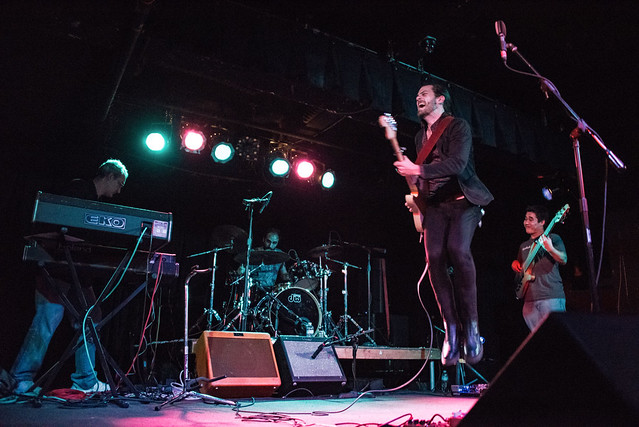
Jonny Grave performing in 2019 at The Black Cat
Artists and fans are turning to live streaming to connect. But it’s a poor substitute, though, because it’s missing a critical element that only live music can provide. Springfield, Virginia native Dave Grohl, touched on that crucial factor recently talking about the time Bruce Springsteen attended a Foo Fighters gig: “…he very generously thanked us and commented on our performance, specifically the rapport we seem to have with our audience. Something he obviously understood very well. When [I] asked where he watched the show from, he said that he’d stood in the crowd, just like everyone else. Of course he did. He was searching for that connection too. A few days later, I received a letter from Bruce, handwritten on hotel stationery, that explained this very clearly. ‘When you look out at the audience,’ he wrote, ‘you should see yourself in them, just as they should see themselves in you.’ ”

Near Northeast performing in 2020 at Comet Pizza Ping Pong
NIVA is relying on music fans of all genres, local merchants, and the general public for support. Venue membership is free and is accessible at the NIVA website. Traditionally, independent venues and promoters have been isolated from one another, struggling to survive in competitive, local marketplaces. The pandemic closures have changed that, though. The power of unity and common purpose to pressure the federal government is needed more than ever today and the general public has a crucial role to play, as well: NIVA needs our support, not for money, but instead to pressure our congressional representatives and senators to save the independent venues in our communities.
It’s handy, simple, and takes about two minutes to fill in and send.
Each small, individual action can result in great things.

